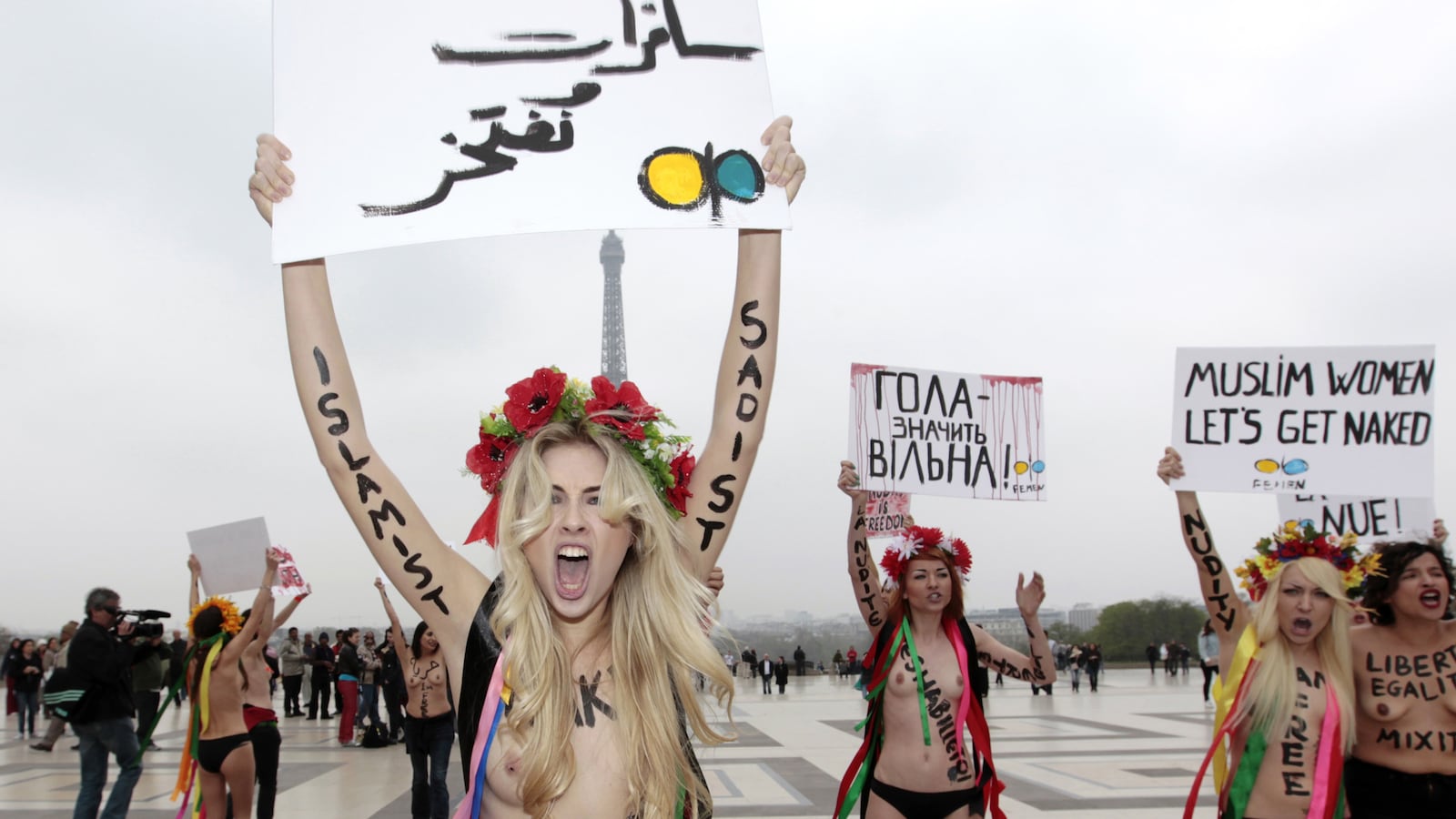Before Sidi Bouzid became the cradle of the Arab Spring, before Zine el Abidine Ben Ali ran away from Tunis with his bars of gold and his greedy family, before a 19-year-old called Amina took off her blouse and wrote across her chest “My body is mine not somebody’s honor” there was feminism in Tunisia.

Partially this is because of geographic location. Tunisia is close to Italy, France, and Spain and much of the educated population are polyglots who grew up watching global television. A series of grammar schools for über smart kids opened in the 1970s, meaning that an entire generation of bright Tunisians—men and women—was fostered. Even under the dictatorship of Ben Ali, education was promoted. Women rose to ranks that were unheard of in other Arab countries.
Now the Islamic Ennahda party dominates the Tunisian government, and there are growing reports that more hard-line Salafists are rising in power as well. Those reports are often disputed by Tunisians themselves who say that they are an exaggeration of the press. Either way, women’s rights are under siege. The mentality of the country is shifting, leaning away from its secular past and becoming ever more conservative.
Amina’s answer to this threat was to take off her clothes and give the finger to the camera, a move that brought her instant online infamy. This was an attempt to bring the Ukrainian “feminist” group Femen to Tunisia.
I am not a fan of Femen, an international group that promotes its “activism” through nudity, although I would say I am a third-generation feminist. My feminist heroine, Gloria Steinem worked as a Playboy bunny in the 1960s, but she did it to write an article and also to investigate what sexism was really like at the Playboy Club.
In the case of Femen, I often feel the leader, Inna Shevchenko, has a cause more related to exhibitionism than to genuinely aiding the global female cause. This is not the same as 1970s feminists burning their bras and strutting down Madison Avenue protesting advertising’s sexist image of women.
Femen has dubious motives. It seems one becomes a member simply by stripping down and photographing herself; the images often go viral on Facebook. The group can be amusing, but I am not sure of its mandate. Looking at its various protests worldwide, I am not sure it’s much different from looking at soft porn.
When they ambush Silvio Berlusconi, a known enjoyer of bunga bunga, is it humorous or is it simply provocative? When a group of gorgeous Ukrainians walks down a street wearing thigh-high boots and a pair of panties in the freezing cold, is this going to get us equal wages, or is it going to make men see women more as sexual objects? The topless bleached blondes who pose with their legs spread, supposedly condemning rape, particularly offend me. This does not discourage rape—out there, some disturbed individual is getting off on the sight of a woman’s nether regions displayed prominently.
This is when I turn to my mother’s generation feminist treatise—Susan Brownmiller’s classic book on rape from 1975, Against Our Will, and Gloria Steinem’s Outrageous Acts and Everyday Rebellions from 1983. These women really stood for a cause, and genuinely made a difference. The women of Femen, I cannot help but feel, are attention seekers. They are the YouTube generation getting off on their 15 minutes of bare fame.
Even Amina’s motives seem murky. Since she was condemned to death by stoning by a Salafist cleric, she has gone into hiding and rumors about her well-being are rampant. Some say she has gone into a psychiatric unit. Her lawyer says she is fine and with her parents. She has undoubtedly made her mark on the Internet, her image traveling across the world. But why does she not hit the streets of Tunis like my other activist friends and protest, or blog, or try to highlight the plight of women in a more productive way?
I fear Amina has brought the cause of Tunisian women backward rather than forward. Why provoke a country that stands at the brink of losing rights that women in the past took for granted? Some Tunisian women recently told the BBC that they chose to go back to niqab, the full veil revealing only their eyes, after the revolution of 2011. Other women tell me that while Tunisia has always been an advanced country in terms of women’s rights, they fear these rights will be threatened.
Ennahda, to be sure, has not actually taken away any rights that existed under Ben Ali, such as divorce on equal terms or polygamy. One senior official told the BBC that they are not looking to impose a lifestyle on anyone. “We’re here to defend freedom.” Yet there is a generation of women who are genuinely worried. The changes are not happening yet on the surface, but in the important place, in the underpinnings of society.
“There are more hardliners,” Amna Guellali, director of Human Rights Watch Tunisia said recently. “More of these so-called Salafist groups who tend to impose their own vision of society and religion. I think this might have a very strong effect on women.”
During the Jasmine revolution, and in the joyous months after, it was exhilarating to see so many young women take to the streets, marching in peaceful demonstrations for democracy. I interviewed dozens of young women bloggers, activists, and protesters. They were inspiring. They wanted to be part of the new regime that would usher in freedom, human rights, and equality.
But they were also respectful. Any protester knows that the only way activism works is to get the people on your side. Femen is not exactly endearing themselves to anyone, except perhaps to hormonal teenage boys.
Amina’s heart might be in the right place, but I wish she would cover it up with a T-shirt and protest quietly, but effectively, rather than getting her kit off.






